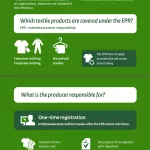
It takes approximately ca. 8000 L of fresh water to grow 1 kg of cotton fibers; for the production of 1 kg of viscose or Tencel fibers, only ca. 450 L and ca. 300 L, respectively, are needed. Hence, there is a huge environmental price to be paid for the production of cotton and man-made cellulose fibers. Researchers worldwide are directing their efforts to develop environmentally friendly ways to produce newer fibres that do not use any toxic chemicals, generate waste, and requires less energy. Scientists and designers in close cooperation have developed a biologically derived filament that can be knit, whether by hand or machine, to create a new breed of textile composed of sodium alginate, a polysaccharide found in the cell walls of brown algae. It’s frequently used in the medical industry for wound dressing.





